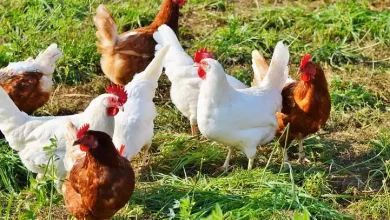How To Start Ugu Farming Business In Nigeria and Make Money
How to start Ugu Farming business in Nigeria
Ugu farming presents a promising opportunity for farmers in Nigeria and other African countries.
By applying best farming practices, managing challenges effectively, and accessing suitable markets, farmers can really make money in this profitable and nutritious agribusiness venture.
In this article, I’ll show you a comprehensive guide on how to start Ugu farming business in Nigeria and become successful in it.
Let’s dive in!
How To Start Ugu Farming Business In Nigeria Successfully

In this step-by-step guide on how to start ugu farming business in Nigeria, you will gain insights into the many things you need to know or ought to have known.
Below are the given guidelines:
Get a Fertile FarmLand
On how to start ugu farming business in Nigeria successfully, the first thing that is required of you is to get yourself farmland.
Look for areas with well-drained loamy soil and a pH range of 6.0 to 7.0, as Ugu thrives best in such conditions.
It doesn’t matter whether you choose to purchase or lease the land, ensure it has adequate sunlight exposure and easy access to water sources for irrigation.
Buy Your Ugu Seeds or Seedlings
The second process on how to start ugu farming business in Nigeria is to buy ugu seeds or seedlings.
This is a major aspect of ugu farming.
Sourcing for high-quality Ugu seeds or seedlings is essential to ensure a productive harvest.
Acquire seeds from reputable agricultural suppliers or seed companies, opting for disease-resistant varieties suitable for the local climate.
Healthy seedlings with well-developed roots are crucial if you prefer transplanting over direct seeding.
Proper seed selection lays the foundation for robust plant growth and a bountiful yield.
Preparation of Farm Land
Preparing the farmland is a critical step that sets the stage for successful Ugu farming.
Clear the land of weeds, rocks, and debris to facilitate proper plant growth.
Plough or till the soil to improve its structure and create rows or raised beds for planting.
Adequate land preparation promotes easy access for maintenance and harvesting while enhancing water drainage and nutrient availability.
Preparing Ugu Seeds or Seedlings
Properly preparing Ugu seeds or seedlings ensures healthy germination and early growth.
If using seeds, soak them in water for about 24 hours before planting to enhance germination rates.
For seedlings, handle them with care during transplantation to prevent root damage.
Preparing seeds or seedlings well in advance optimizes their chances of survival and establishment in the field.
Propagation in Ugu Farming
Ugu can be propagated through direct seeding or transplanting seedlings.
Direct seeding involves sowing the seeds directly into the prepared soil, ensuring proper spacing between them. Alternatively, transplant seedlings into the rows or beds, taking care not to disturb the root system.
Choose a propagation method that aligns with your resources and the prevailing environmental conditions.
Irrigation of Ugu Farm
Maintaining adequate moisture levels is essential for the success of Ugu farming, particularly in regions with irregular rainfall.
Installing an efficient irrigation system, such as drip or sprinkler irrigation, ensures a steady supply of water to the plants. Monitor the soil moisture regularly and adjust the irrigation schedule based on the plant’s needs and prevailing weather conditions.
Applying Fertilizer to Ugu Plants
Proper fertilization is crucial for maximizing Ugu yields.
Conduct a soil test to determine the specific nutrient requirements of your farm. Use organic manure and balanced NPK fertilizers to provide the necessary nutrients for healthy plant growth.
Read: How To Start Okrika Business In Nigeria
Apply fertilizers at the appropriate stages of the crop’s development to optimize their uptake and utilization.
Ugu Farming in Dry Season
With proper irrigation, Ugu farming can be extended to the dry season in some areas of Nigeria.
During this period, water management becomes even more critical to avoid water stress on the plants.
Monitor soil moisture levels closely and ensure that the irrigation system is functioning optimally.
Employ water-saving techniques and mulching to conserve moisture and maintain crop health.
Harvesting
The last stage of Ugu farming is harvesting.
After your Ugu has grown to its maturity period, then it’s high time you sell to consumers.
Also Read: How To Start Cement Business In Nigeria Today
Selling to consumers may begin from home but taken to the marketplace make a difference in terms of quick sales.
FAQs On How To Start Ugu Farming Business In Nigeria
Below are some related frequently asked questions on how to start ugu farming business in Nigeria today with answers:
When is the best time to plant Ugu in Nigeria?
The best time to plant Ugu in Nigeria depends on the region and prevailing weather conditions.
Generally, Ugu is grown during the rainy season when there is sufficient moisture in the soil to support seed germination and plant growth.
However, if you can do proper irrigation, Ugu farming can be extended to the dry season in some areas.
How do I prepare the soil for Ugu farming?
Preparing the soil for Ugu farming involves clearing the land of weeds, rocks, and debris.
Plough or till the soil to improve its structure and create planting rows or raised beds.
Incorporate organic matter into the soil to enhance its fertility and nutrient content. Conducting a soil test can provide valuable insights into the soil’s nutrient status, enabling you to apply the appropriate fertilizers.
Can I grow Ugu in containers or pots?
Yes, you can grow Ugu in containers or pots, making it suitable for urban and small-scale farming.
Choose large containers with good drainage holes and fill them with a well-balanced potting mix.
Transplant Ugu seedlings into the containers, and ensure they receive adequate sunlight and water regularly. However, in larger-scale commercial farming, open fields are more commonly used.
How often should I water my Ugu plants?
Ugu is a kind of vegetable that requires consistent moisture throughout its growth cycle, especially during the germination and flowering stages.
The frequency of watering depends on the weather conditions and soil moisture levels.
In regions with irregular rainfall, adopt an efficient irrigation system and monitor the soil moisture regularly to ensure the plants receive the right amount of water.
How long does it take for Ugu to mature and be ready for harvest?
Ugu usually matures within 6 to 8 weeks after planting, depending on the variety and growing conditions.
Harvesting can begin once the leaves are tender and reach the desired size. Frequent and selective harvesting encourages continuous growth and improves overall yield.
Where can I sell my Ugu produce?
You can sell your Ugu produce in local markets, to retailers, or wholesalers. Networking with vegetable vendors and restaurants can also create potential buyers.
Additionally, consider exploring online platforms and agricultural cooperatives for wider market reach.









